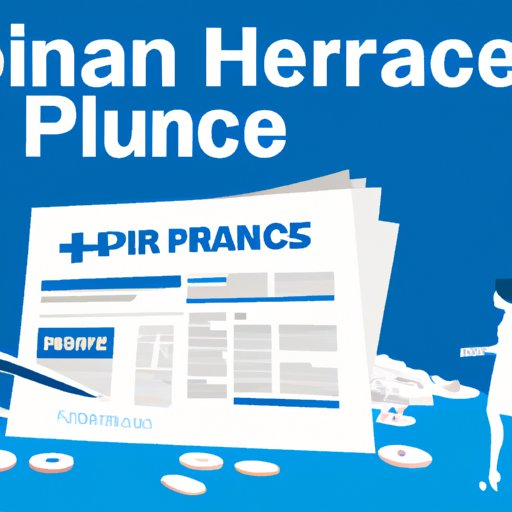Introduction
Health insurance is a vital part of our lives. It helps us access quality care and saves us money in the long run by providing preventive care benefits. But for many people, the cost of health insurance can be prohibitive. If you’re struggling to make ends meet, paying for health insurance may seem impossible. In this article, we’ll explore different strategies and solutions to help you get the coverage you need if you can’t afford health insurance.

Analyzing the Financial Impact of Not Having Health Insurance
When you don’t have health insurance, you’re at risk of incurring high medical bills if you get sick or injured. Depending on the severity of your condition, you could end up with thousands of dollars in medical debt. This debt can have a major impact on your financial situation, as it can hurt your credit score and make it difficult to borrow money for other purposes.
Exploring Low-Cost Options for Getting Health Coverage
If you’re looking for low-cost options for getting health coverage, there are several options available. The Affordable Care Act (ACA) offers subsidized health insurance plans to qualifying individuals and families. These plans have lower premiums and deductibles than traditional health insurance plans. High-deductible health plans are another option that may offer lower monthly premiums than other plans.
Short-term health insurance plans are also an option for those who can’t afford health insurance. These plans typically provide coverage for a limited period of time (up to 12 months) and may be more affordable than other plans. However, they often have higher deductibles and limited coverage, so it’s important to read the fine print before signing up for a plan.
Examining the Benefits of Having Health Insurance
Having health insurance has many benefits. With health coverage, you’ll have access to quality care when you need it. You’ll also be able to take advantage of preventive care benefits, which can save you money in the long run. And most importantly, having health insurance gives you peace of mind knowing you won’t incur huge medical bills if you become ill or injured.
Investigating State and Federal Assistance Programs for Health Insurance
If you’re eligible, you may be able to get assistance from state and federal programs to help pay for health insurance. Medicaid and the Children’s Health Insurance Program (CHIP) are two programs that provide free or low-cost health coverage for qualifying individuals and families. Some healthcare providers may also offer sliding scale fee options for those who can’t afford their services.
In addition, you may be able to get premium tax credits to help you pay for health insurance purchased through the ACA Marketplace. To find out if you qualify for any of these programs, contact your local Department of Human Services.

Looking at Alternative Strategies to Lower Costs
If you don’t qualify for any government assistance programs, there are still ways to lower your health care costs. You can call your healthcare provider and negotiate a lower rate for your services. You can also compare prices of medications at different pharmacies to get the best deal. And if you’re willing to accept some limitations on your coverage, you might consider joining a health cost sharing ministry.

Exploring the Pros and Cons of Going Without Health Insurance
Going without health insurance can be risky, but there are some pros and cons to consider. On the plus side, you won’t have to pay a monthly premium or copay for doctor’s visits. But the downside is that if you get sick or injured, you could be responsible for huge out-of-pocket medical expenses. It’s important to weigh the pros and cons carefully before deciding to go without health insurance.
Evaluating Short-Term Health Insurance Plans
Short-term health insurance plans have both advantages and disadvantages. On the plus side, they generally offer lower premiums than traditional health insurance plans. But they also have limits on coverage, and they don’t cover pre-existing conditions. To be eligible for a short-term health insurance plan, you must be between jobs or waiting for a new job to start. It’s also important to compare the cost of a short-term health insurance plan with other types of health insurance before making a decision.
Conclusion
If you’re struggling to afford health insurance, there are strategies and solutions available to help you get the coverage you need. From subsidized health insurance plans through the Affordable Care Act to short-term health insurance plans, there are options to fit any budget. Be sure to investigate all the available options and seek help from local resources if needed. With the right plan in place, you can get the coverage you need and gain peace of mind.
(Note: Is this article not meeting your expectations? Do you have knowledge or insights to share? Unlock new opportunities and expand your reach by joining our authors team. Click Registration to join us and share your expertise with our readers.)
